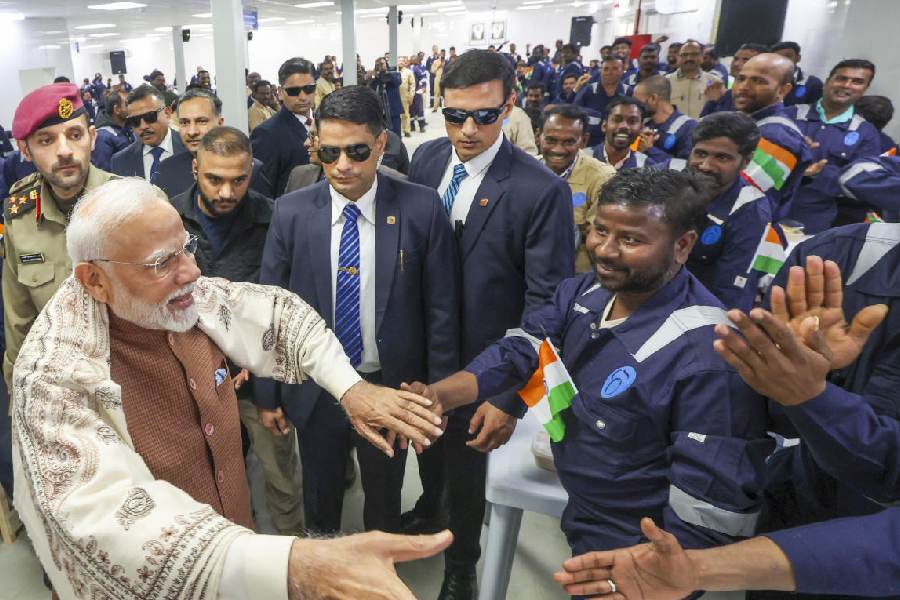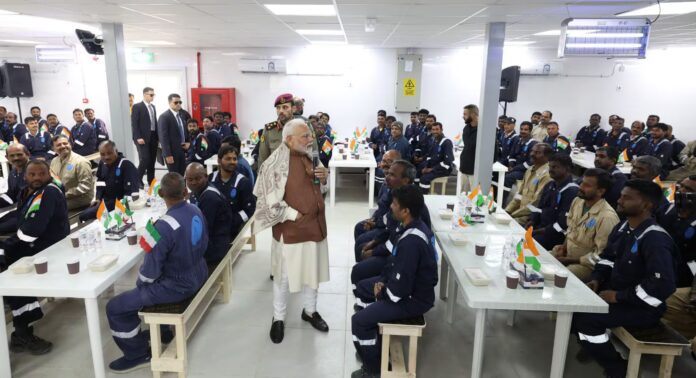PM Modi Meets Indian Expats during his historic visit to Kuwait, marking the first official visit by an Indian Prime Minister to the Gulf nation in 43 years. On Saturday, as the inaugural engagement of his trip, Prime Minister Narendra Modi visited a labour camp in the Mina Abdullah area, home to approximately 1,500 Indian workers. His visit underscores the importance the Indian government places on the welfare of Indian workers abroad.
PM Modi Meets Indian Expats To Highlight Welfare Initiatives
During his visit to the Gulf Spic Labour Camp, PM Modi interacted with Indian workers from various states, inquiring about their well-being and engaging in casual conversations. He sat at a table with some of the workers as snacks were served, creating a warm and approachable atmosphere. The Ministry of External Affairs (MEA) described this visit as symbolic of the government’s commitment to ensuring the welfare of its expatriate community.
The MEA further highlighted the introduction of several technology-based initiatives aimed at supporting Indian workers abroad, including the e-Migrate portal, MADAD portal, and the enhanced Pravasi Bharatiya Bima Yojana. These programs aim to simplify administrative processes, address grievances, and ensure the safety and security of Indian expatriates.

Significance Of Modi’s Visit To Kuwait
Modi’s visit comes just months after a tragic fire in Kuwait’s Mangaf locality claimed the lives of over 45 Indian workers in June. His visit to the labour camp serves as a gesture of solidarity and reassurance to the Indian expatriate community. The Indian community constitutes the largest expatriate group in Kuwait, making up 21% of the total population and 30% of the workforce. Indian workers dominate the private sector and domestic service workforce, reflecting their significant contribution to Kuwait’s economy.
India-Kuwait Bilateral Ties
The relationship between India and Kuwait is marked by deep historical and economic ties. Kuwait ranks as India’s sixth-largest crude supplier, meeting 3% of its energy needs. Bilateral trade between the two nations reached USD 10.47 billion in the financial year 2023-24, with Indian exports to Kuwait crossing USD 2 billion for the first time. Investments by the Kuwait Investment Authority in India exceed USD 10 billion, reflecting mutual trust and cooperation.
Historically, the India-Kuwait relationship dates back to the pre-oil era when maritime trade formed the backbone of Kuwait’s economy. These enduring ties have strengthened over the decades, evolving into a robust partnership encompassing trade, investment, and cultural exchanges.
Modi’s Commitment To Expatriate Welfare
The visit also highlights PM Modi’s focus on engaging with the Indian diaspora and addressing their concerns. Over the years, the Indian government has introduced several initiatives to enhance the living and working conditions of expatriates. The e-Migrate portal simplifies recruitment processes, while the MADAD portal provides a platform for addressing grievances. Additionally, the Pravasi Bharatiya Bima Yojana ensures insurance coverage for Indian workers abroad, reflecting a holistic approach to their welfare.

Indian Expats’ Role In Kuwait’s Economy
With over 1 million Indians residing in Kuwait, they form a vital part of the country’s workforce and contribute significantly to its economy. Indian workers are integral to both the private and domestic sectors, underscoring their importance in Kuwait’s socio-economic framework. This expatriate community also plays a crucial role in strengthening cultural and economic ties between the two nations.
India’s Expanding Gulf Engagement
PM Modi’s visit to Kuwait is part of a broader strategy to deepen ties with Gulf nations. India’s engagement with the Gulf has seen significant growth, driven by trade, energy cooperation, and the large Indian diaspora in the region. Kuwait’s position as a key trading partner and energy supplier makes it a pivotal player in India’s Gulf policy.
The visit also aligns with India’s efforts to bolster its global footprint by strengthening relationships with strategic partners. Through such initiatives, the government aims to ensure that the Indian diaspora remains a bridge for fostering bilateral cooperation.
A Milestone Visit
PM Modi’s interaction with Indian expats in Kuwait serves as a testament to the government’s dedication to its citizens abroad. The gesture of visiting a labour camp and personally engaging with workers reflects a human-centric approach to diplomacy. This visit not only strengthens India-Kuwait relations but also reinforces the government’s commitment to the welfare of Indian workers, who form the backbone of many economies around the world.
This historic visit will likely pave the way for further initiatives aimed at deepening ties between India and Kuwait while ensuring that the Indian diaspora continues to receive the support and recognition it deserves.

